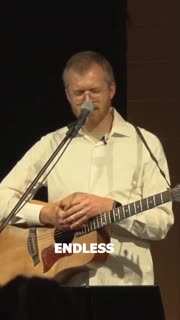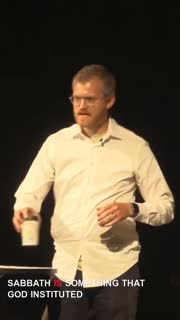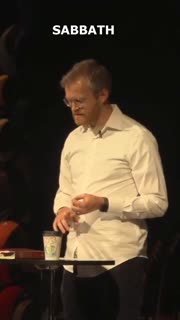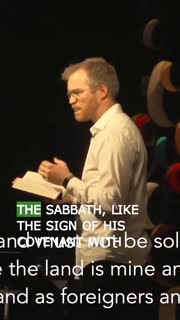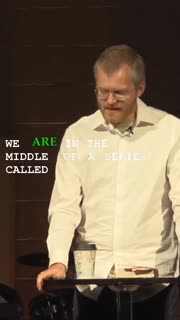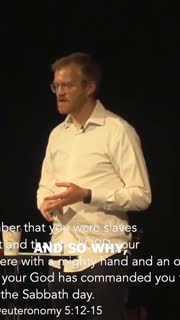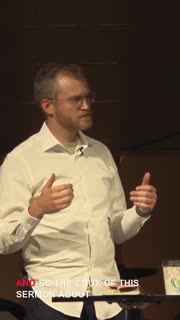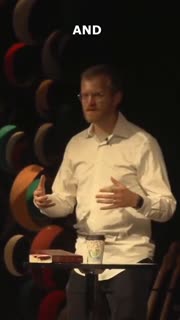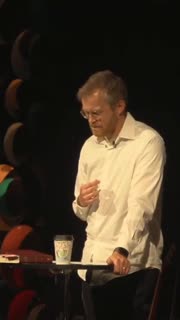Trusting God's Provision: Embracing Sabbath and Jubilee
Devotional
Sermon Summary
Bible Study Guide
Sermon Clips
### Quotes for Outreach
1. "When there will be more than enough, not just for us, but for all who come to the house of the Lord. So Lord, we worship you. We praise you. We give you thanks this morning because you are trustworthy. You are faithful to your promises. Your wonderful mercy. Seemingly endless patience." [21:32] (60 seconds)
2. "Sabbath is something that God instituted from the beginning, and we'll recap what it is at its very onset in just a moment. But I want to give us the background. God foreknew in each of you and in us as people that we would be prone to overwork. God foreknew that we would be prone to the fear that causes anxiety, that causes busyness." [55:44] (26 seconds)
3. "The Sabbath was made for man, not man for the Sabbath. So the son of man is Lord even of the Sabbath. And Jesus, observing that the religious leaders of his day were using Sabbath as a way to enslave people, condemned them in many ways, said, no, no, no, no, no, you've got it backwards. Men are not beholden to the Sabbath so that the Sabbath can be elevated above them. The Sabbath is given to men so that men may be free." [01:03:03] (32 seconds)
4. "The Sabbath originated famously from the very beginning, the very, very beginning. Well, slightly after the beginning, six days later, on the seventh, technically. God created in six days, this is Genesis 2, and by the seventh day, he finished the work. So on the seventh day, he rested from all his work." [01:08:11] (25 seconds)
5. "The Sabbath, like the sign of his covenant with us, as our husband and we his bride, he will provide, he will protect. In verse 23, the land must not, not be sold permanently because the land is mine and you reside in my land as foreigners and strangers. This is the year of Jubilee, according to the law of God." [01:28:23] (45 seconds)
### Quotes for Members
1. "We are in the middle of a series called Overburdened Land, where we explore how God desires us to interact with the earth itself, the very soil and dirt, the ground underneath our feet, the way that God teaches us to observe our whole community, his church, his bride, as his vineyard, whom he loves and wants to see good fruit growing from, and the soil even of our own hearts." [52:12] (29 seconds)
2. "And so why, coming out of slavery, did God command Sabbath? Well, because he was teaching them how to be like him. Right? Because God rested on the seventh. I rested on the seventh. Going into the promised land where they will receive their inheritance. Why are they commanded to practice Sabbath? So they don't reinstate the yoke of bondage of slavery on others." [01:14:07] (34 seconds)
3. "And so the crux of this sermon about rest and jubilee and what it means for you and for us as a church and for the greater body of Christ at large is simply trust God enough to say that even though it feels like I can't, we can. And he will provide more in the sixth year than you need for the three years to come. Test him in this." [01:35:44] (26 seconds)
4. "Sabbath and jubilee were not things that were forgotten as relics of the old covenant by the church, but they were recognized as God's eternal reality that we get to live into now with all of our neighbors and into all of the places that he sends us. Never owners. Always stewards. Sabbath is about freedom. Jubilee is about freedom." [01:32:39] (35 seconds)
5. "And beloved, I also think we need to consider not only the ways we can rest, but the ways that we can create rest for others. There's barely enough for me, surely not enough for them. Or more poignantly, I need cheap labor or my society won't exist the way it does anymore." [01:35:03] (24 seconds)
Ask a question about this sermon
1. "When there will be more than enough, not just for us, but for all who come to the house of the Lord. So Lord, we worship you. We praise you. We give you thanks this morning because you are trustworthy. You are faithful to your promises. Your wonderful mercy. Seemingly endless patience." [21:32] (60 seconds)
2. "Sabbath is something that God instituted from the beginning, and we'll recap what it is at its very onset in just a moment. But I want to give us the background. God foreknew in each of you and in us as people that we would be prone to overwork. God foreknew that we would be prone to the fear that causes anxiety, that causes busyness." [55:44] (26 seconds)
3. "The Sabbath was made for man, not man for the Sabbath. So the son of man is Lord even of the Sabbath. And Jesus, observing that the religious leaders of his day were using Sabbath as a way to enslave people, condemned them in many ways, said, no, no, no, no, no, you've got it backwards. Men are not beholden to the Sabbath so that the Sabbath can be elevated above them. The Sabbath is given to men so that men may be free." [01:03:03] (32 seconds)
4. "The Sabbath originated famously from the very beginning, the very, very beginning. Well, slightly after the beginning, six days later, on the seventh, technically. God created in six days, this is Genesis 2, and by the seventh day, he finished the work. So on the seventh day, he rested from all his work." [01:08:11] (25 seconds)
5. "The Sabbath, like the sign of his covenant with us, as our husband and we his bride, he will provide, he will protect. In verse 23, the land must not, not be sold permanently because the land is mine and you reside in my land as foreigners and strangers. This is the year of Jubilee, according to the law of God." [01:28:23] (45 seconds)
### Quotes for Members
1. "We are in the middle of a series called Overburdened Land, where we explore how God desires us to interact with the earth itself, the very soil and dirt, the ground underneath our feet, the way that God teaches us to observe our whole community, his church, his bride, as his vineyard, whom he loves and wants to see good fruit growing from, and the soil even of our own hearts." [52:12] (29 seconds)
2. "And so why, coming out of slavery, did God command Sabbath? Well, because he was teaching them how to be like him. Right? Because God rested on the seventh. I rested on the seventh. Going into the promised land where they will receive their inheritance. Why are they commanded to practice Sabbath? So they don't reinstate the yoke of bondage of slavery on others." [01:14:07] (34 seconds)
3. "And so the crux of this sermon about rest and jubilee and what it means for you and for us as a church and for the greater body of Christ at large is simply trust God enough to say that even though it feels like I can't, we can. And he will provide more in the sixth year than you need for the three years to come. Test him in this." [01:35:44] (26 seconds)
4. "Sabbath and jubilee were not things that were forgotten as relics of the old covenant by the church, but they were recognized as God's eternal reality that we get to live into now with all of our neighbors and into all of the places that he sends us. Never owners. Always stewards. Sabbath is about freedom. Jubilee is about freedom." [01:32:39] (35 seconds)
5. "And beloved, I also think we need to consider not only the ways we can rest, but the ways that we can create rest for others. There's barely enough for me, surely not enough for them. Or more poignantly, I need cheap labor or my society won't exist the way it does anymore." [01:35:03] (24 seconds)
